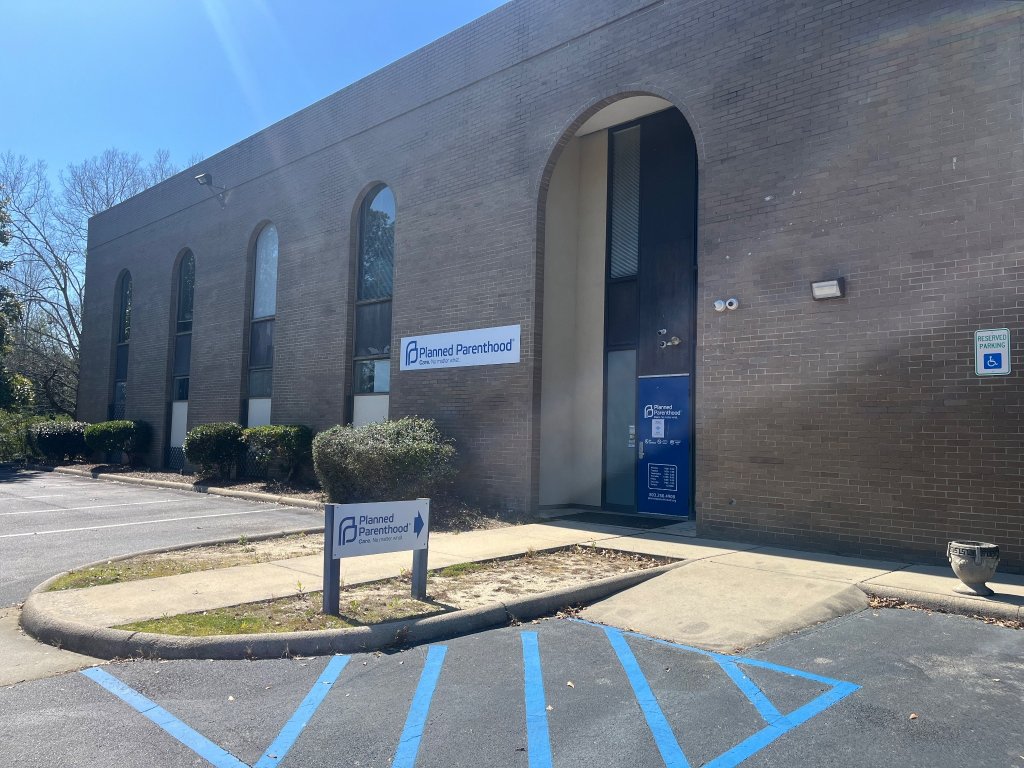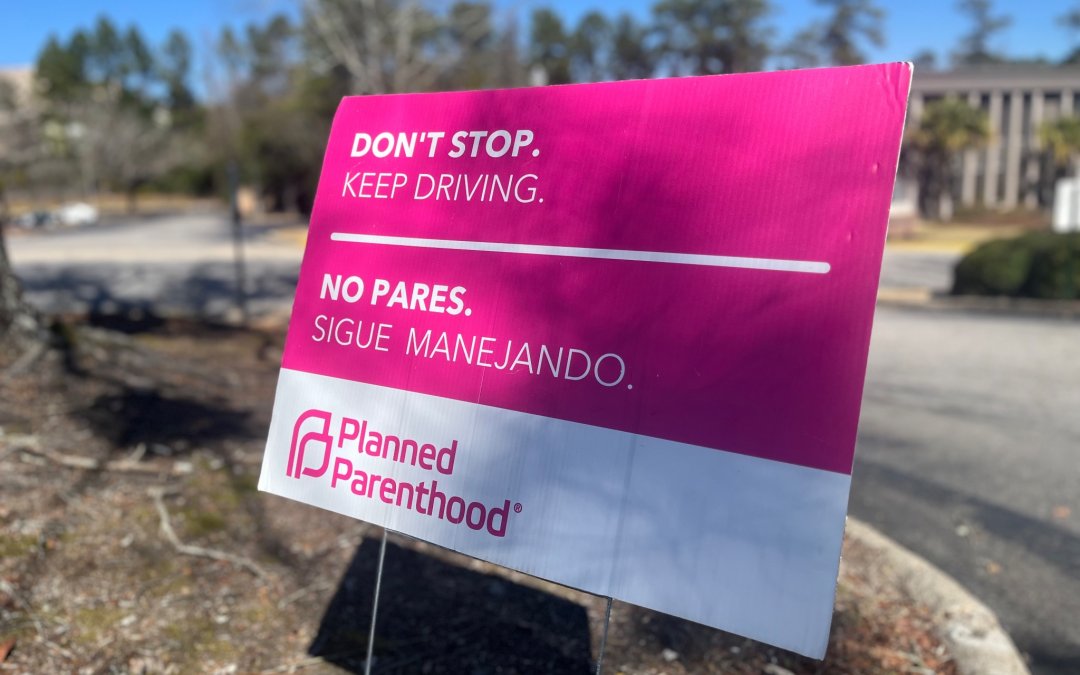COLUMBIA, S.C. – Between a real estate attorney’s office and a county magistrate building sits one of South Carolina’s three abortion clinics. Pink and white signs beckon patients, discreetly placed so as not to invite unwanted attention.
Since the overturning of Roe v. Wade in 2022, women and advocates in the state of South Carolina have struggled to safeguard access to reproductive health care, including abortions. Existing policies tend to penalize, rather than uplift, patients seeking care and those who help them. But the people who work on the front lines don’t want to leave. Their work is a crucial part of who they are, they say.
South Carolina’s maternal mortality rate is the eighth-highest in the nation, according to the South Carolina Law Review. Vicki Ringer, the director of public affairs at Planned Parenthood South Atlantic, said she is critical of lawmakers focusing on the wrong victims of an under-resourced health care system.
“Women have died and will continue to die,” she said. “This should require some action on behalf of our legislature – whether that’s in research, expanding Medicaid or providing more rural health care. All of those things would make sense, but the legislature does not do any of those things.”
In August 2023, the state Supreme Court upheld a ban on abortion after six weeks of pregnancy, a similar law that had been struck down just eight months before. After the court’s only female justice retired, it reversed this protection, forcing providers to turn away patients at a stage before many of them even know they are pregnant.
While abortion takes center stage as a national political talking point, so many other facets of reproductive care remain difficult to access throughout the country, including contraception, in vitro fertilization and sex education in elementary schools.
“Our reproductive health care restrictions are some of the most restrictive in the nation,” said Kelli Parker, the director of communications and marketing for the Women’s Rights and Empowerment Network (WREN). “Most South Carolinians support access to reproductive health care. But it’s continually being limited through our legislators that have very extreme ideas about what reproductive health care actually is.”

The Planned Parenthood Health Center in Columbia is one of only three abortion clinics in the state of South Carolina. (Simone Garber/MNS)
It never occurred to Parker that her 11-year-old daughter wouldn’t have the same right to bodily autonomy as she once did. Having grown up in New York, Parker’s access to health care in Charleston, S.C. over the past five years has been vastly different from the medical privacy she’s used to.
“I think people who live outside of the South really take for granted the amount of freedom you have,” she said.
Parker’s agency, based in Columbia, works to expand access to health care, education and economic opportunities for women, girls and gender-expansive people throughout the state. Since 2017, WREN has advised patients seeking reproductive services in a state that was one of the first to impose near-total abortion bans after Roe’s reversal.
Recent policing of gender-affirming care comes from male lawmakers’ need for “control,” Parker said.
“It’s important to remember that abortion bans and restrictions don’t do anything to protect anyone’s health or safety – they’re only punishment,” she said. “Why would you want to elect someone who’s out to punish you?”
Ina Seethaler is the director of college outreach at the Palmetto State Abortion Fund, a volunteer-run organization working to offset the financial barriers to reproductive justice in South Carolina. The fund subsidizes abortion procedures and logistical costs, including transportation and lodging for out-of-state appointments.
Seethaler called South Carolina a “reproductive health care desert,” as local physicians often weigh high-stakes decisions that could leave them incarcerated.
According to the S.C. Office for Healthcare Workforce, 14 out of the state’s 46 counties do not have a practicing OB-GYN. That translates to a ratio of 0.43 for every 1,000 women of reproductive age, according to a South Carolina Center for Rural and Primary Healthcare research brief.
“Folks don’t want to move here,” Seethaler said. “They don’t want to practice here. It’s becoming, frankly, kind of dangerous for them to work here. But things are just going to get worse again at the expense of the people in South Carolina.”
And it’s not just a lack of trained professionals that’s driving the reproductive health care shortage. For patients in desperate situations facing few options and little reliable information, many turn to crisis pregnancy centers (CPCs) for answers. These institutions, which reproductive justice advocates say impart misinformation to pregnant people rather than support, generated nearly $1.4 billion in revenue in the 2022 fiscal year and continue to increase in scope and size nationwide.
As a result of CPC expansion, Seethaler said, many reproductive justice organizations are finding it difficult to persuade patients of their legitimacy.
“That overlap is, unfortunately, really problematic,” she said.
The 35 CPCs in South Carolina well outnumber the abortion clinics in the state. In addition to Columbia, two other Planned Parenthood Health Centers are located in Charleston and Greenville, all at least 100 miles away from one another.
Ringer’s lobbying efforts at the Columbia State House are constantly challenged at the clinic sites, where protesters will “literally drag patients into vans” stockpiled with ultrasounds.
“All of these folks exist only to harass patients,” she said. “They don’t provide any real services. It’s just dogma they’re imposing on people that they’re trying to stop from having an abortion.”
These days, the stakes of health care suppression are extending to other reproductive issues. Last month, the Alabama Supreme Court ruled that frozen embryos would be considered “children” under state law, a mandate that could jeopardize the practice of IVF.
While Alabama has since passed a law to protect IVF treatments, legal experts note that language in other states related to so-called fetal personhood leave many open questions about liability.
“Alabama’s ruling is extremely alarming,” Elisabeth Smith, director of state policy at the Center for Reproductive Rights, wrote in a statement. “This is part of the chaos we knew would ensue if Roe v. Wade was overturned. With politicians at the helm instead of doctors, reproductive health care is in crisis.”
Navigating an increasingly polarized workplace and industry, Ringer underscored her personal motivation for continuing this line of work.
“I know that there are others still in this fight, but I can’t just throw up my hands,” she said. “Everybody deserves the right to decide if, when and how to become parents. Pregnant women, most of all, deserve their own freedom to make a decision.”


